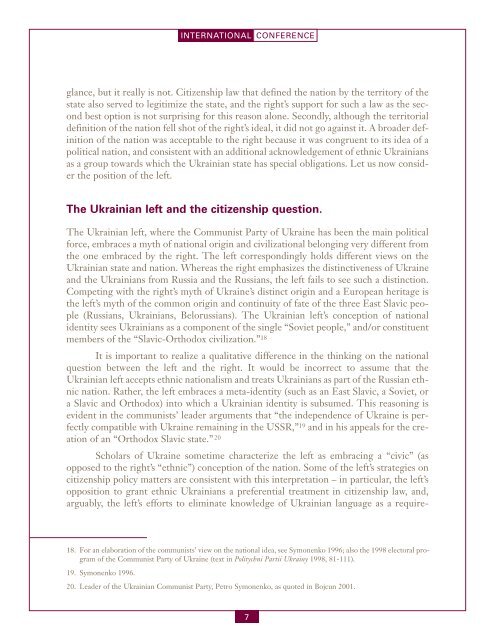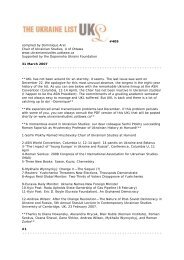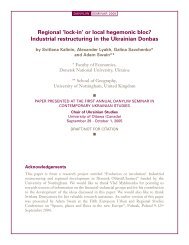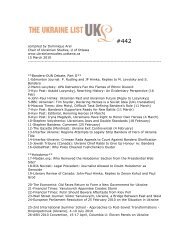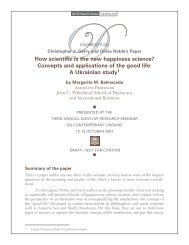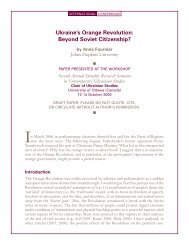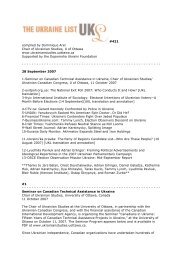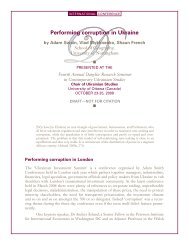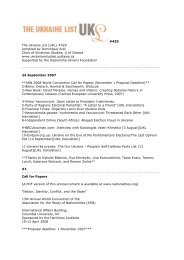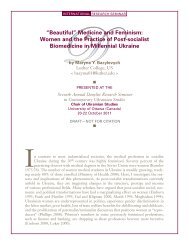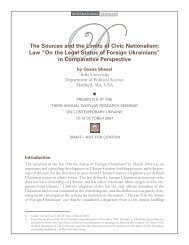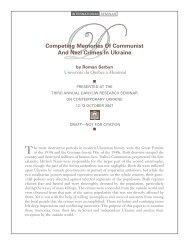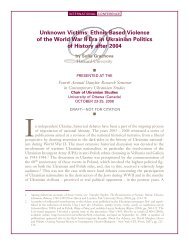Citizenship and nation-building in Ukraine - Chair of Ukrainian Studies
Citizenship and nation-building in Ukraine - Chair of Ukrainian Studies
Citizenship and nation-building in Ukraine - Chair of Ukrainian Studies
You also want an ePaper? Increase the reach of your titles
YUMPU automatically turns print PDFs into web optimized ePapers that Google loves.
INTERNATIONAL CONFERENCE<br />
glance, but it really is not. <strong>Citizenship</strong> law that def<strong>in</strong>ed the <strong>nation</strong> by the territory <strong>of</strong> the<br />
state also served to legitimize the state, <strong>and</strong> the right’s support for such a law as the second<br />
best option is not surpris<strong>in</strong>g for this reason alone. Secondly, although the territorial<br />
def<strong>in</strong>ition <strong>of</strong> the <strong>nation</strong> fell shot <strong>of</strong> the right’s ideal, it did not go aga<strong>in</strong>st it. A broader def<strong>in</strong>ition<br />
<strong>of</strong> the <strong>nation</strong> was acceptable to the right because it was congruent to its idea <strong>of</strong> a<br />
political <strong>nation</strong>, <strong>and</strong> consistent with an additional acknowledgement <strong>of</strong> ethnic Ukra<strong>in</strong>ians<br />
as a group towards which the Ukra<strong>in</strong>ian state has special obligations. Let us now consider<br />
the position <strong>of</strong> the left.<br />
The Ukra<strong>in</strong>ian left <strong>and</strong> the citizenship question.<br />
The Ukra<strong>in</strong>ian left, where the Communist Party <strong>of</strong> Ukra<strong>in</strong>e has been the ma<strong>in</strong> political<br />
force, embraces a myth <strong>of</strong> <strong>nation</strong>al orig<strong>in</strong> <strong>and</strong> civilizational belong<strong>in</strong>g very different from<br />
the one embraced by the right. The left correspond<strong>in</strong>gly holds different views on the<br />
Ukra<strong>in</strong>ian state <strong>and</strong> <strong>nation</strong>. Whereas the right emphasizes the dist<strong>in</strong>ctiveness <strong>of</strong> Ukra<strong>in</strong>e<br />
<strong>and</strong> the Ukra<strong>in</strong>ians from Russia <strong>and</strong> the Russians, the left fails to see such a dist<strong>in</strong>ction.<br />
Compet<strong>in</strong>g with the right’s myth <strong>of</strong> Ukra<strong>in</strong>e’s dist<strong>in</strong>ct orig<strong>in</strong> <strong>and</strong> a European heritage is<br />
the left’s myth <strong>of</strong> the common orig<strong>in</strong> <strong>and</strong> cont<strong>in</strong>uity <strong>of</strong> fate <strong>of</strong> the three East Slavic people<br />
(Russians, Ukra<strong>in</strong>ians, Belorussians). The Ukra<strong>in</strong>ian left’s conception <strong>of</strong> <strong>nation</strong>al<br />
identity sees Ukra<strong>in</strong>ians as a component <strong>of</strong> the s<strong>in</strong>gle “Soviet people,” <strong>and</strong>/or constituent<br />
members <strong>of</strong> the “Slavic-Orthodox civilization.” 18<br />
It is important to realize a qualitative difference <strong>in</strong> the th<strong>in</strong>k<strong>in</strong>g on the <strong>nation</strong>al<br />
question between the left <strong>and</strong> the right. It would be <strong>in</strong>correct to assume that the<br />
Ukra<strong>in</strong>ian left accepts ethnic <strong>nation</strong>alism <strong>and</strong> treats Ukra<strong>in</strong>ians as part <strong>of</strong> the Russian ethnic<br />
<strong>nation</strong>. Rather, the left embraces a meta-identity (such as an East Slavic, a Soviet, or<br />
a Slavic <strong>and</strong> Orthodox) <strong>in</strong>to which a Ukra<strong>in</strong>ian identity is subsumed. This reason<strong>in</strong>g is<br />
evident <strong>in</strong> the communists’ leader arguments that “the <strong>in</strong>dependence <strong>of</strong> Ukra<strong>in</strong>e is perfectly<br />
compatible with Ukra<strong>in</strong>e rema<strong>in</strong><strong>in</strong>g <strong>in</strong> the USSR,” 19 <strong>and</strong> <strong>in</strong> his appeals for the creation<br />
<strong>of</strong> an “Orthodox Slavic state.” 20<br />
Scholars <strong>of</strong> Ukra<strong>in</strong>e sometime characterize the left as embrac<strong>in</strong>g a “civic” (as<br />
opposed to the right’s “ethnic”) conception <strong>of</strong> the <strong>nation</strong>. Some <strong>of</strong> the left’s strategies on<br />
citizenship policy matters are consistent with this <strong>in</strong>terpretation – <strong>in</strong> particular, the left’s<br />
opposition to grant ethnic Ukra<strong>in</strong>ians a preferential treatment <strong>in</strong> citizenship law, <strong>and</strong>,<br />
arguably, the left’s efforts to elim<strong>in</strong>ate knowledge <strong>of</strong> Ukra<strong>in</strong>ian language as a require-<br />
18. For an elaboration <strong>of</strong> the communists’ view on the <strong>nation</strong>al idea, see Symonenko 1996; also the 1998 electoral program<br />
<strong>of</strong> the Communist Party <strong>of</strong> Ukra<strong>in</strong>e (text <strong>in</strong> Politychni Partii Ukra<strong>in</strong>y 1998, 81-111).<br />
19. Symonenko 1996.<br />
20. Leader <strong>of</strong> the Ukra<strong>in</strong>ian Communist Party, Petro Symonenko, as quoted <strong>in</strong> Bojcun 2001.<br />
7


